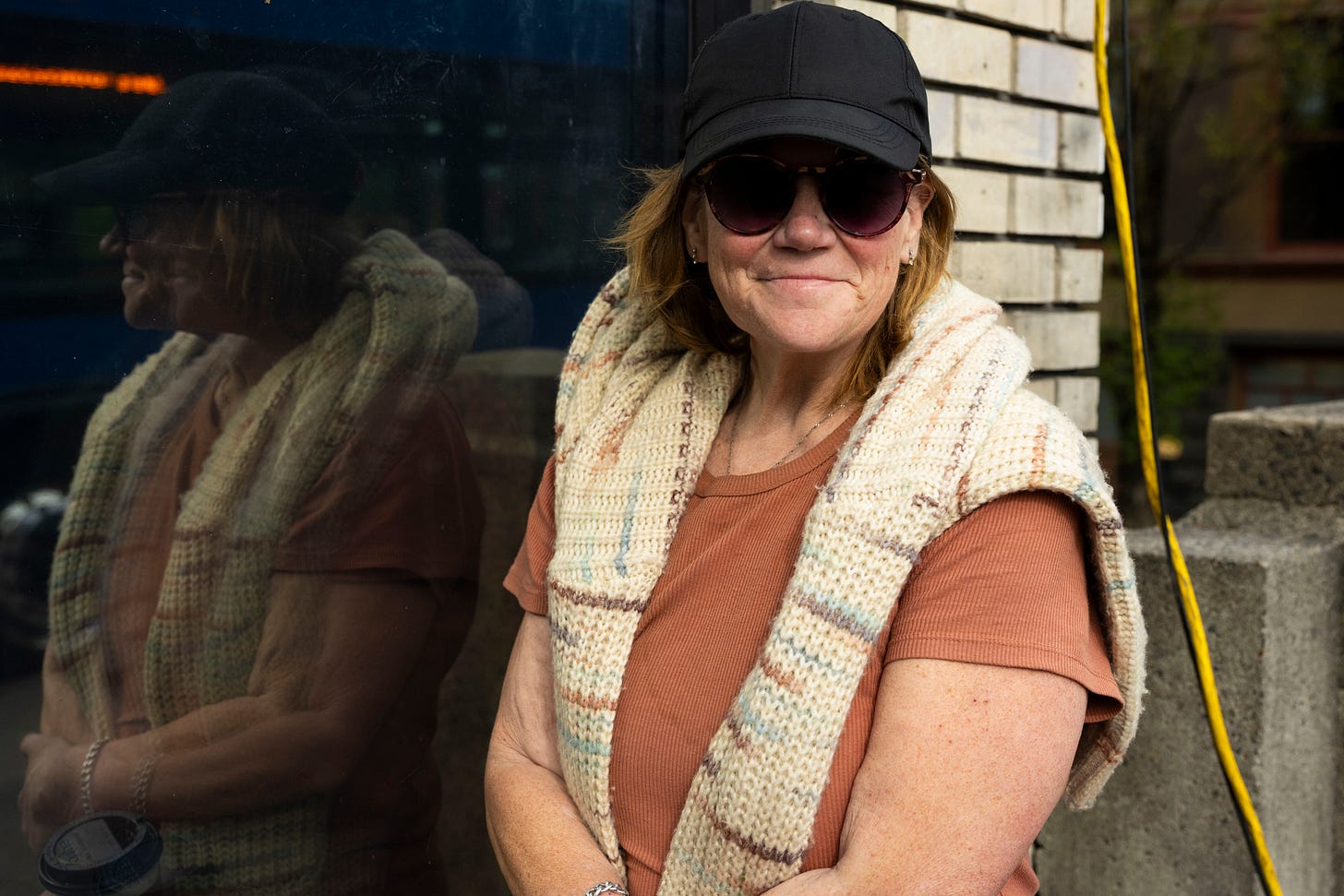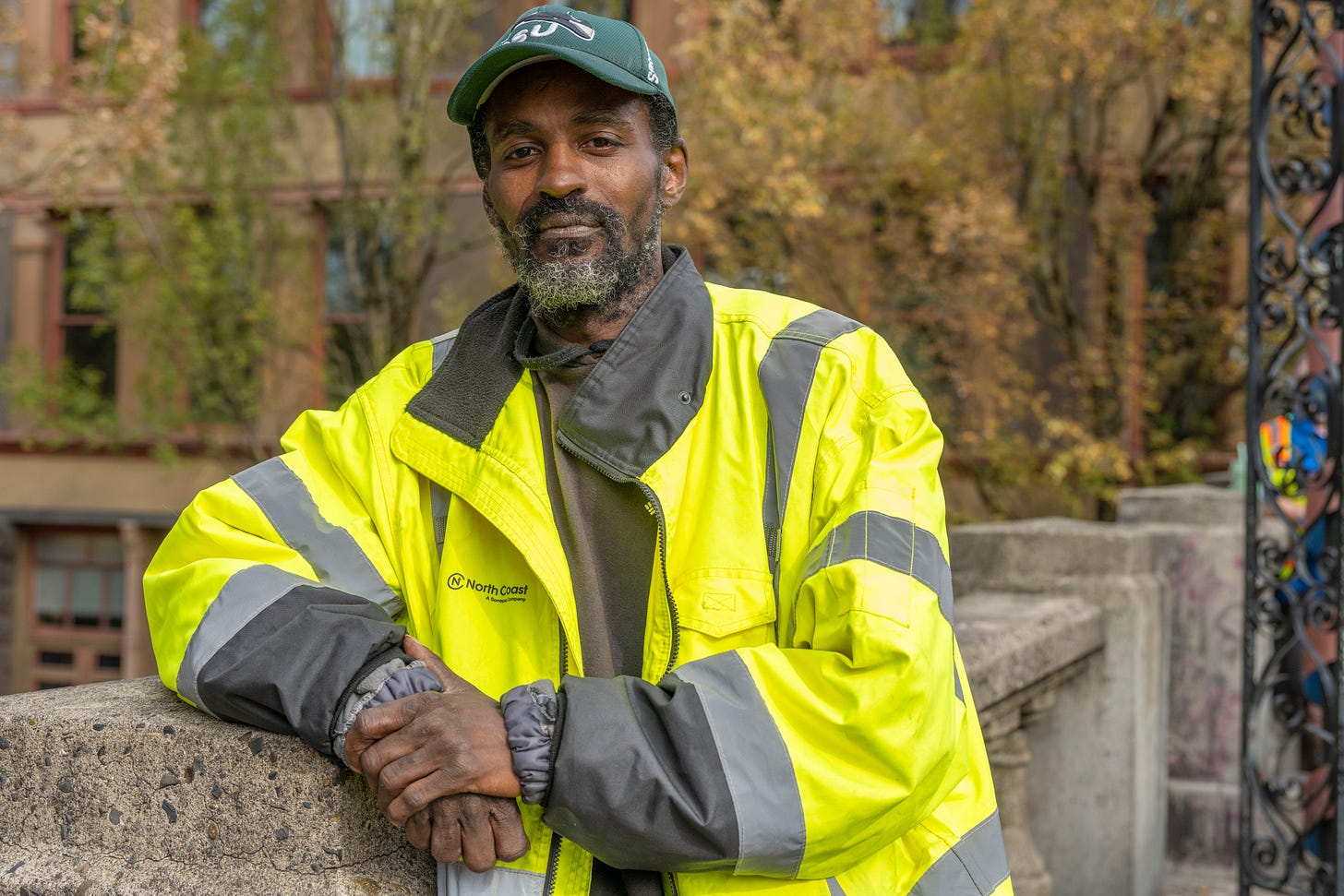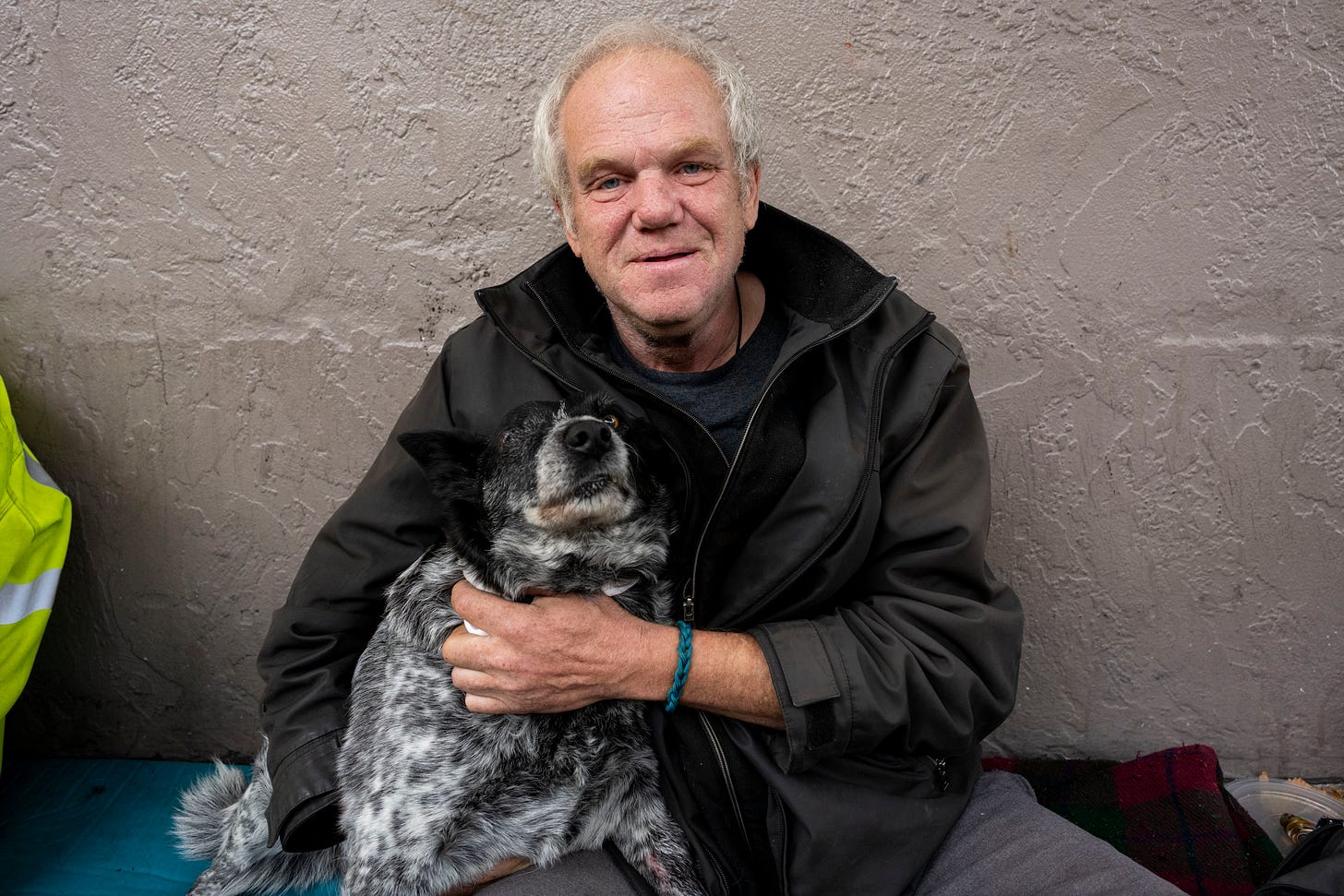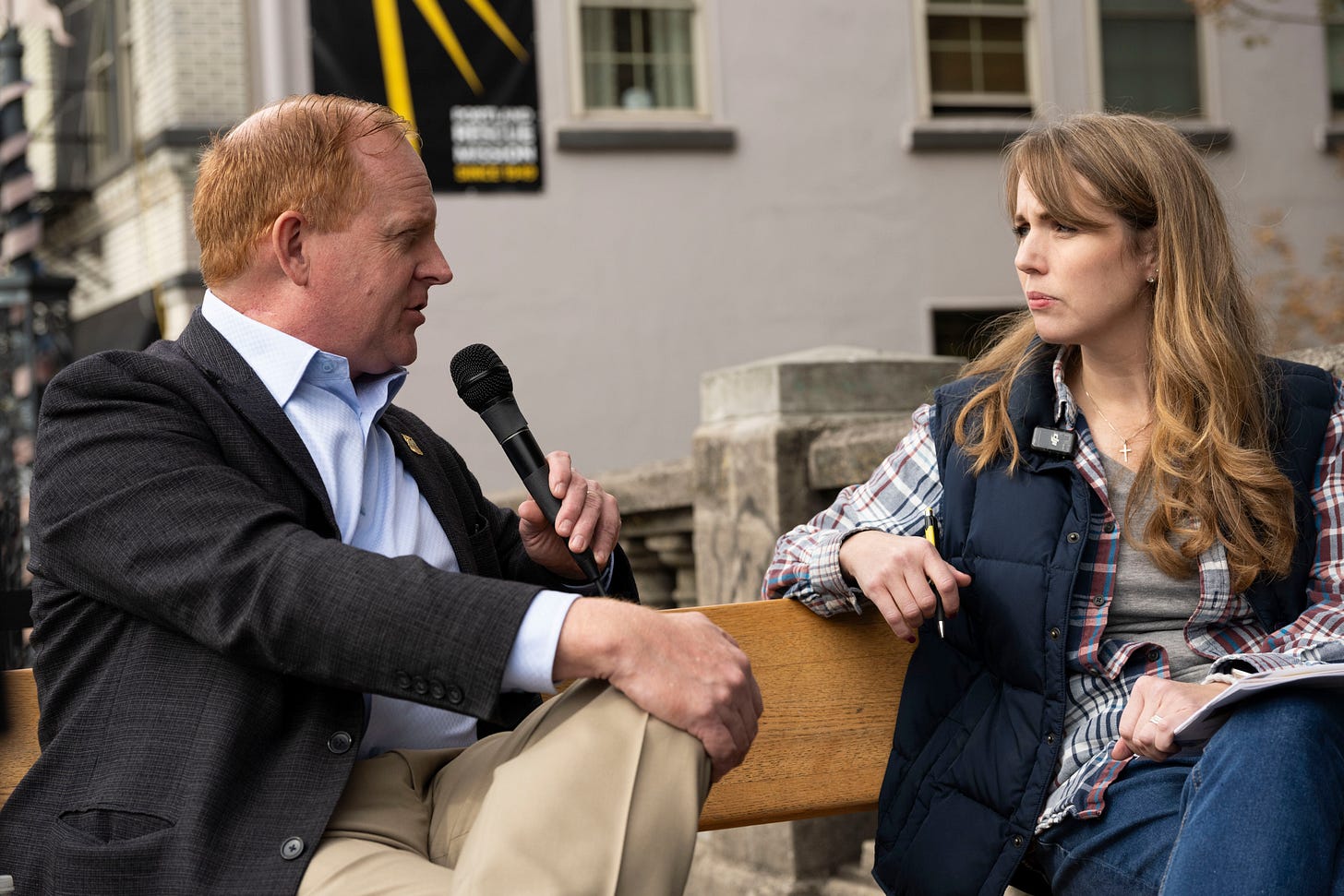View from the C-suite: 24 hours on a bench on Burnside
Portland Rescue Mission interim CEO sits and listens … to all

Did you hear about the local CEO who pulled an all-nighter sitting on a bench on Burnside? Erin Holcomb is the interim CEO of Portland Rescue Mission, a private 76-year-old nongovernmental agency that helps transform the lives of people suffering from homelessness or drug addiction. Last week, in connection with World Homeless Day, Holcomb decided that she’d spend 24 hours parked on a wooden bench at First and West Burnside—talking with and listening to people from all walks of life. The common thread, of course, was homelessness.
So, with a small crew and a camera and a live stream going out worldwide on YouTube and Facebook, Holcomb sat on her bench from noon Thursday right through the night until noon Friday. Over those 24 hours, she talked with about 40 people, including local leaders, politicians, the mayor, the police chief and plenty of ordinary folks on the street who wanted to sit and visit. As Portland Rescue Mission noted in announcing Holcolmb’s extended bench-sit, “Erin’s act of stillness is countercultural. Instead of shouting solutions or trading rhetoric, she’s creating a space for listening, presence and truth-telling.” Holcomb’s conversations reached roughly 23,000 unique visitors online.
What did she learn? First and perhaps most obviously, Holcomb says, “there’s not a one-size fits all solution” to homelessness. Whether unhoused individuals are suffering from drug addiction, or severe mental illness, or simply have no job and hence no money to pay for food and shelter, “each person really needs to be seen as a unique individual,” Holcomb believes. And for this reason, she says, “it will take everybody in the community to help us find the path forward.”
Are we in Portland making any progress on this seemingly intractable issue? Holcomb offers an unqualified “yes.”
“I have not had a day in the 20 years of working at Portland Rescue Mission that I’ve not seen people making progress. I don’t think I could do this job if I didn’t see people making progress, conquering addictions or making changes to create new lives.”
So, while Holcomb was visiting with folks in the street, so did we. And, paralleling her observation, each of the homeless people we met had a somewhat different backstory. Estimates vary regarding the percentage of the homeless population who suffer from serious mental illness or addiction to powerful drugs such as fentanyl, but the percentage is not small. It could be a majority. We’ll tackle that part of the issue in a later story in the NW Examiner.
“Pineapple” McMahon tells us she has been homeless for more than two years. After holding down steady jobs for about a decade in New Jersey and in New York City with HBO, she moved to Portland hoping to land something in independent media. Nothing came through, her money ran out, she got into a tiff with her then-landlord over allegedly falsified apartment rental papers, got locked out and has been on the street since. Now she goes to the Portland Rescue Mission for breakfast and dinner. There, overnight accommodations are for men only, though women can sleep across West Burnside at the Salvation Army.
But Pineapple says she’d rather sleep in a tent outdoors than in a shelter with dozens of other women. “It’s awful being in the same room … with people coughing … getting up all hours.” She says she’s got a “ridiculously high level of education” with both bachelor’s and master’s degrees, and has been sober for seven years. Still, she says she keeps “falling between the cracks,” in part, she concedes, because she keeps missing appointments with people and agencies that have been trying to help her. What does Pineapple say she really wants most? Just to “stabilize” her life.
James Johnson has worked on and off for Amazon at its Washington County distribution center, but says he was recently let get go because he wasn’t meeting his work quota--handling 250 items an hour. “I gotta build back up, get me a new apartment,” he says. “I just need time to save up ... so I could start paying my own rent, you know?” For now, James says he’s working on-call hours for a moving company. “But it’s about to the rainy season and the winter is coming up. So its gonna start slowing down.”
Where does James sleep? He’s got a bunk bed at the Portland Rescue Mission. We ask him if he’d rather just be on the street. “No, no, no, no, no,” James says emphatically, adding that he neither drinks nor is on drugs. When he lost his job and money ran out, he put his stuff in storage. “I had three cats, I had to give them up, you know?”
Roger Grimes worked security in San Francisco for the city’s Chronicle and the Examiner newspapers for nearly 30 years. But once he quit, he says, “it’s hard to get work when you’re older.” He lived out of an RV for a while ‘till his money ran out. Now he sleeps in a tent on the street in Portland with his one-eyed dog, Jake. Grimes says he’s not on drugs and never has been. His biggest challenge right now? “I’d love to get some work. I could at least pay for a room and sleep somewhere decent” where he could stay—along with Jake.
Among the people who came by the bench to visit with Portland Rescue Mission interim CEO Erin Holcomb was Portland Police Chief Bob Day.









The highlight that stuck with me in this piece is the individual stories that is very much what we are confronting with the homeless. I applaud the efforts of the Union Gospel Mission, The Salvation Army, and others that provide shelter and an opportunity for the homeless to begin anew and try to find a way to support themselves independently. Aside from shelters provided by our taxes or places like the Portland Rescue Mission which I think are charitable organizations, and food also provided by charitable organizations, we are missing the need for a strong community based short term civil commitment system for those on the street who are severely mentally ill and adversely affecting the safety, civility, and beauty of our public square. Until we get that third piece, a practical and immediate civil commitment system in place, many of the other efforts will just "feed the beast". Many people have expressed it, but it bears repeating. NO MORE ENABLING THE HOMELESS.
Sometimes there are simple solutions to complex problems. Let's start with this: if you provide a lot of free things to people who don't or can't work they will come. While I recognize that a lot of these folks need help, local government and the homeless industrial complex it has spawned have provided so many free things and failed to enforce laws that it acts as a magnet for people in this situation. Forty years ago when the Rajneeshees wanted to import the homeless to vote for them they had to go to LA and other cities far from Oregon to find the numbers they needed. Today those numbers are in Portland because we provide more free things and fail to enforce laws that impede this kind of life. It's that simple. What's lacking is the will.